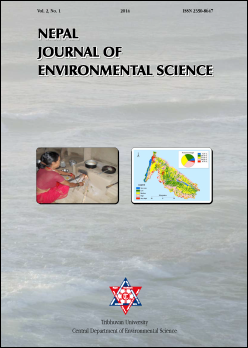Improved cooking stoves as an eco-friendly practice for reducing fuel-wood and CO2 emission: A case of Meghauli, Chitwan, Nepal
DOI:
https://doi.org/10.3126/njes.v2i0.22743Keywords:
Biomass, Carbon Dioxide Emission, Climate Change, Improved Cooking Stoves, Respiratory ProblemsAbstract
The energy demand is ever increasing with the growing population with increased consumption and living standard. In the developing country like Nepal, traditional sources of energy such as fuel-wood, dung and agriculture residues are still in use. Such a traditional energy sources and cooking practices have several environmental and health implications. The present study was carried out in Meghauli Village Development Committee of Chitwan districts in which attempts have been made to assess the status of Improved Cooking Stoves (ICS) and its contribution in reducing firewood consumption, carbon dioxide (CO2) emission that help saving time and lessening women drudgery in household work and ultimately reducing climate change impacts. Moreover, health status of the people was also undertaken. For the purpose, household survey method was applied for gathering the information. The results showed that ICS to be more efficient compared to the traditional cooking stoves. The average firewood consumption for household purpose prior to installation of ICS was found to be 310.62 kg/month which reduced to 253 kg/month, i.e. 57.62 kg less in a month. This helped to reduce CO2 emission by an average value of 105.44 kg/month. It has also been reported that there was substantial (262 hours in a year) reduction in time consumption for household work. However, yet higher number of people (11.63%) was found suffering from respiratory and eye diseases probably due to biomass burning and other labor based works.
Downloads
Downloads
Published
How to Cite
Issue
Section
License
This license enables reusers to distribute, remix, adapt, and build upon the material in any medium or format for noncommercial purposes only, and only so long as attribution is given to the creator.

